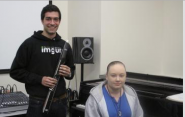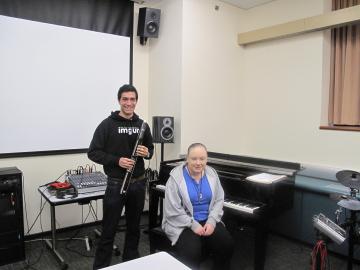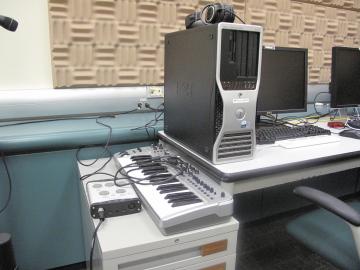Taking Computer Music Out Of The Lab For A Performance

As a computer musician, Mark Santolucito runs into a lot of misconceptions.
"People always say, 'Oh, so you're a DJ' - and it's really not that at all," said Santolucito, a Ph.D. student in the Computer Science Department. "It's not EDM [electronic dance music], it's not dubstep, and I'm not mixing. It's a different set of creative choices that we make. A better name than 'computer music' might be 'computational music.' We're making choices about how to structure the computation and then we see what happens in the music."
 You can see for yourself this Friday when the Yale Haskell Group puts on a concert in Euterpea Studio in Arthur K. Watson Hall. It's the Computer Science Department's first concert of computer music.
You can see for yourself this Friday when the Yale Haskell Group puts on a concert in Euterpea Studio in Arthur K. Watson Hall. It's the Computer Science Department's first concert of computer music.
The Yale Haskell Group has played an integral role in the conception, evolution, implementation, and application of the Haskell programming language. One of the founders of Haskell was the late Paul Hudak, a professor of computer science and a dedicated jazz musician who started the computer music program in the Computer Science Department.
Santolucito, who will be one of the four performers Friday, said the concert should be a good showcase for work that rarely gets much exposure beyond the computer music community. The compositions produced in the Computer Science department tend to be more research-based, he said, "so it's not really a standard protocol to show them off."
"There's always an inherent part of composition, but for us, the driving force behind what we do as computer scientists is to create something of computational value and then see how we apply it to music," he said. "It is a research department, so we need to be doing computational research."
If this all sounds a tad academic for a Friday evening, fear not. While preparing for the concert inside Euterpea Studio, Santolucito pulls out an electronic wind instrument, better known as an EWI.
"I'll be playing on this thing," he says. "This is a really fun piece of equipment. It's an electronic version of a saxophone, more or less."
Another performer, Donya Quick, will present compositions made by Kulitta, a computer program she developed that produces its own compositions, sometimes in the style of J.S. Bach. She make air quotes with her fingers when she says "performing."
"It's the longest piece that I've ever had Kulitta do so," said Quick, a lecturer in Computer Science. "It's a very electronic synthesizer sort of thing, so it's not using any of the things in here live. I'll just step off to the side. I've got it hooked up to some algorithmic visuals so people have something to watch during it."
High-tech instruments, cool visuals and never-before-heard compositions – a concert of research-based music has a lot to offer.
"I thought it would be a nice idea to have people come check out what we're doing," Santolucito said. "People get more excited about listening to music than about reading papers – I think that's fair to say."
The event begins at 5:30 p.m. at Arthur K. Watson Hall, 51 Prospect St., Euterpea Studio (first floor). Admission is free. Go here for more details.

